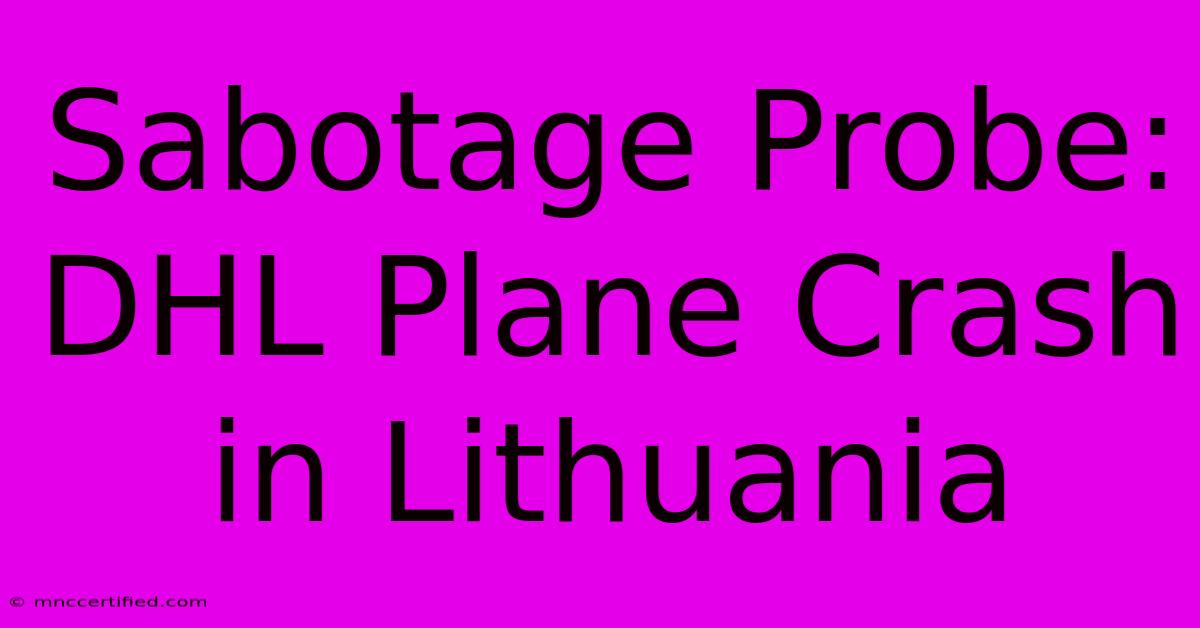Sabotage Probe: DHL Plane Crash In Lithuania

Table of Contents
Sabotage Probe: DHL Plane Crash in Lithuania – Unraveling the Mystery
On August 4, 2023, a DHL Boeing 757-200F cargo plane crash-landed in Vilnius, Lithuania, sparking a major investigation into the potential causes of the incident. While initial reports focused on technical malfunctions, the investigation has shifted towards a more ominous possibility: sabotage. This article delves into the ongoing probe, examining the key evidence and exploring the potential implications of a deliberate act of destruction.
The Crash: A Close Call
The DHL plane, operating flight number 699, experienced a catastrophic failure during its approach to Vilnius International Airport. The aircraft, carrying freight, skidded off the runway after a hard landing, resulting in substantial damage to the undercarriage and fuselage. Miraculously, both pilots escaped with minor injuries. The swift and decisive actions of the crew are widely credited with preventing a potentially far more devastating outcome. The immediate aftermath saw a significant emergency response, with firefighters, paramedics, and airport personnel rapidly deploying to secure the scene.
The Investigation: Shifting Focus to Sabotage
Initial investigations focused on possible mechanical failures, typical in aviation accident probes. However, as forensic experts and investigators meticulously examined the wreckage and flight data recorders, suspicion began to shift towards the possibility of intentional sabotage. While specific details remain confidential to protect the integrity of the ongoing investigation, reports suggest the presence of unusual damage to the aircraft that cannot be easily attributed to a mechanical fault.
Key Aspects of the Investigation:
- Wreckage Analysis: The careful examination of the aircraft's wreckage is paramount. Investigators are searching for evidence of explosives, tampering, or other signs of intentional damage. This meticulous process includes both visual inspection and advanced forensic techniques.
- Flight Data Recorder (FDR) and Cockpit Voice Recorder (CVR) Analysis: Data from the FDR and CVR offer crucial insights into the events leading up to the crash. Analyzing this information can reveal whether the pilots experienced any unusual events or anomalies prior to the incident. Discrepancies between the data and the pilots' accounts could indicate foul play.
- Security Protocols: The investigation will likely scrutinize airport security protocols and procedures to identify any possible lapses that could have facilitated sabotage. This review will involve examining passenger and cargo screening processes, access control systems, and overall security measures at Vilnius International Airport.
- International Cooperation: Given the potential for international implications, collaborations with other countries' intelligence and security agencies are likely underway to share information and explore possible connections.
Potential Implications and Fallout
The possibility of sabotage carries far-reaching implications. If confirmed, it would represent a serious security breach and a significant threat to global aviation safety. Such an act would necessitate a thorough reassessment of security protocols at airports worldwide, potentially leading to increased scrutiny and stricter regulations. Furthermore, identifying the perpetrators would be paramount, necessitating a complex and potentially lengthy investigation.
The Path Ahead: Transparency and Accountability
The investigation surrounding the DHL plane crash in Lithuania is ongoing, and a conclusive determination regarding the cause remains pending. Maintaining transparency during this crucial period is vital to build public trust and ensure accountability. As more information emerges, it’s crucial to rely on verified reports from official sources and avoid speculative narratives that could undermine the integrity of the investigation. The international community keenly awaits the findings of this crucial inquiry, which will have profound implications for the future of aviation security.
Keywords: DHL plane crash, Lithuania, Vilnius airport, aircraft accident, aviation safety, sabotage investigation, forensic investigation, flight data recorder, cockpit voice recorder, airport security, international cooperation, aviation security protocols, Boeing 757, cargo plane crash.

Thank you for visiting our website wich cover about Sabotage Probe: DHL Plane Crash In Lithuania. We hope the information provided has been useful to you. Feel free to contact us if you have any questions or need further assistance. See you next time and dont miss to bookmark.
Featured Posts
-
Can Auto Insurance Be Backdated
Nov 26, 2024
-
Lana Del Rey Announces Stadium Tour
Nov 26, 2024
-
Barry Bonds Baseball Card 1990
Nov 26, 2024
-
Ronaldo Double Lifts Al Nassr
Nov 26, 2024
-
Live Stream Nuggets Vs Knicks Game Details
Nov 26, 2024